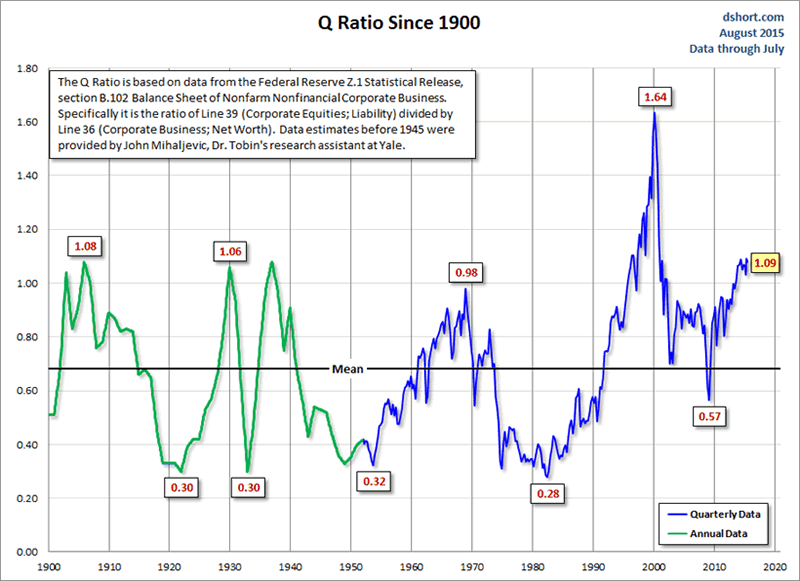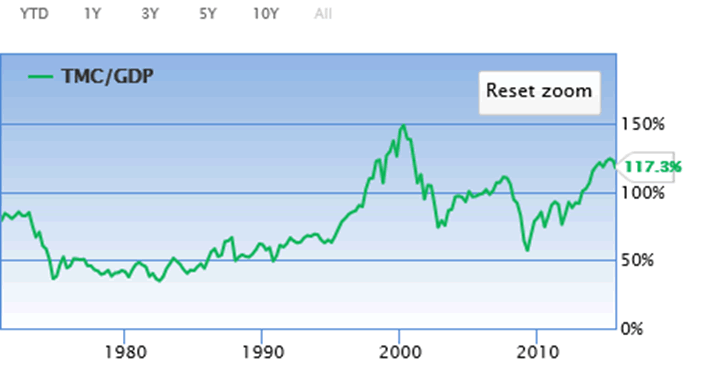Stock Market Calls Fed’s Bluff
Stock-Markets / Stock Markets 2015 Aug 31, 2015 - 04:38 PM GMTBy: Michael_Pento
 As the Fed nears its proposed first rate hike in nine years the stock market is becoming frantic. The Dow Jones Industrial Average is down around 10% on the year, as markets digest the troubling reality that our central bank may be raising interest rates into an emerging worldwide deflationary collapse.
As the Fed nears its proposed first rate hike in nine years the stock market is becoming frantic. The Dow Jones Industrial Average is down around 10% on the year, as markets digest the troubling reality that our central bank may be raising interest rates into an emerging worldwide deflationary collapse.
The Fed normally raises rates when inflation is becoming intractable and robust growth is sending long-term rates spiking. However, this proposed rate hike cycle is occurring within the context of anemic growth and deflationary forces that are causing long-term U.S. Treasury rates to fall.
The yield curve spread, specifically the difference between Fed Funds Rate and the 10-year Note, is usually close to 4 percentage points at the start of major tightening cycles. This was the case at the start of the 1994 and 2004 campaigns to curb inflation. However, this go around the spread is less than 2 percentage points and the benchmark 10-Year Note yield is falling. This means the yield curve will invert very quickly and cut off banks’ profitability and incentives to lend; which will greatly exacerbate the deflationary impulses reverberating across the globe.
These deflationary forces will collide head on with a stock market that is already extremely overvalued as measured by Tobin’s Q ratio (the total value of corporate equities/replacement cost) and the total market cap to GDP.
Tobin’s Q Ratio:

Total Market Cap/GDP:

But the overvalued condition of stocks gets even worse when viewed in the context of anemic growth and the prospect of a hawkish Fed. Revenue growth, or the lack thereof, for S&P 500 companies was a negative 3.3% in Q2, leading to a minus 1% earnings growth for this benchmark Index.
U.S. GDP has not been faring much better, averaging a lackluster 2% annual growth rate since 2010. The highly accurate Atlanta Fed GDP Now has forecast GDP at just 1.3% for Q3, far short of what many perma-bulls on Wall Street are calling for.
For first time in its history the Fed would be raising rates into anemic and slowing GDP growth, negative earnings and revenue growth, and falling long-term interest rates.
And don’t believe Wall Street’s mantra that the deflationary forces emanating from China won’t affect stock prices because, as many claim, it accounts for a small percentage of S&P 500 revenue. This is the same flawed logic that led many of those same Cheerleaders to conclude subprime mortgages were a small subset of housing and would never spill over to national home prices or the economy.
The problem for China is that the government spent $20 trillion since 2007 building an unprecedented and unsustainable fixed asset bubble. Now that misallocation of capital has exhausted itself and the nation is left drowning in debt. Those emerging market economies who supplied China with its infrastructure materials have run out of that bubble-induced demand and are now flirting with recession.
Europe, a major exporter to China, is growing at just above 1%. It is highly likely that following Japan’s negative Q2 GDP print the nation may be entering its third recession since 2012. And two of the highly vaunted BRIC economies, Russia and Brazil, are shrinking as well.
This global deflation and economic stagnation isn’t easily remedied. China cut its reserve requirement ratio and interest rates again this week; but the People’s Bank of China has done so five times since November of 2014 to no avail. It’s becoming apparent: China has lost command and control of their command and controlled markets and economy.
The Fed has deployed a Zero Interest Rate Policy for seven years and has already printed $3.7 trillion to boost markets and GDP growth. And U.S. debt to GDP is over 100%. Japan’s debt to GDP is at 230% and the Bank of Japan (BOJ) is printing 7 trillion yen ($58 billion) per month of QE. The European Central Bank (ECB) is printing $67 billion a month and the European Union (EU) has negative interest rates; but all this easy money and deficit spending isn’t helping these economies move much off the flat line.
There just isn’t much fiscal or monetary policy room left to maneuver. Global debt is up a whopping $60 trillion since the end of the Great Recession and interest rates are at all-time lows. The problem isn’t that the cost of money is too high or that its availability is scarce. The issue is global economies have become debt disabled and suffer from massive capital imbalances. These conditions can’t be fixed by more money printing.
This brings us back to Ms. Yellen and co. and the Fed’s current threat to raise rates. The Fed is aware there wouldn’t be a solvent entitlement program or pension plan without stock price increases of around 8% each year. A tightening cycle when markets and economies are on life support would put that target very far out of reach.
Therefore, look for the Fed to back away from rate hikes in the next few weeks as the Federal Open Market Committee finally realizes it will be stuck at near zero for many years to come. This should cause the highly overcrowded long dollar trade to roll over sharply very soon and provide investors to profit in anti-dollar investments such as precious metals.
A prudent investor should hide out in cash and hedge their portfolios against more carnage to come in the near term. That is, at least until the Fed’s fire brigade switches to a dovish monetary policy stance and comes running with another round of money printing. Maybe that will temporarily stop the bleeding in stock prices; but please don’t be fooled into believing it will save the economy.
Michael Pento produces the weekly podcast “The Mid-week Reality Check”, is the President and Founder of Pento Portfolio Strategies and Author of the book “The Coming Bond Market Collapse.”
Respectfully,
Michael Pento
President
Pento Portfolio Strategies
www.pentoport.com
mpento@pentoport.com
(O) 732-203-1333
(M) 732- 213-1295
Michael Pento is the President and Founder of Pento Portfolio Strategies (PPS). PPS is a Registered Investment Advisory Firm that provides money management services and research for individual and institutional clients.
Michael is a well-established specialist in markets and economics and a regular guest on CNBC, CNN, Bloomberg, FOX Business News and other international media outlets. His market analysis can also be read in most major financial publications, including the Wall Street Journal. He also acts as a Financial Columnist for Forbes, Contributor to thestreet.com and is a blogger at the Huffington Post.Prior to starting PPS, Michael served as a senior economist and vice president of the managed products division of Euro Pacific Capital. There, he also led an external sales division that marketed their managed products to outside broker-dealers and registered investment advisors.
Additionally, Michael has worked at an investment advisory firm where he helped create ETFs and UITs that were sold throughout Wall Street. Earlier in his career he spent two years on the floor of the New York Stock Exchange. He has carried series 7, 63, 65, 55 and Life and Health Insurance Licenses. Michael Pento graduated from Rowan University in 1991.
© 2015 Copyright Michael Pento - All Rights Reserved
Disclaimer: The above is a matter of opinion provided for general information purposes only and is not intended as investment advice. Information and analysis above are derived from sources and utilising methods believed to be reliable, but we cannot accept responsibility for any losses you may incur as a result of this analysis. Individuals should consult with their personal financial advisors.
Michael Pento Archive |
© 2005-2022 http://www.MarketOracle.co.uk - The Market Oracle is a FREE Daily Financial Markets Analysis & Forecasting online publication.



